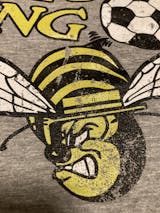Guest blogger: Andy Crossley, Fun While It Lasted
World Team Tennis (WTT), the pioneering 1970’s co-ed tennis league fronted by Billie Jean King, is having a moment. WTT descended from the same family tree of audacious sportsmen and hucksters that birthed the American Basketball Association (ABA), the World Hockey Association (WHA), and the World Football League (WFL). However, it has never enjoyed anything like the cult following accorded to those iconic Me Decade rebel enterprises.
That’s a shame because, during its original five-year run from 1974 to 1978, World Team Tennis elevated female and transgender athletes to a previously unfathomed stature in American team sports. It also riled up the tradition-bound (and hostile) international tennis establishment and attracted an international rogues gallery of superstars and investors. Through it all, the league’s most enduring star and booster would remain Billie Jean King. She famously headlined the blockbuster exhibition that would provide a platform for the co-ed league’s launch with her September 1973 “Battle of the Sexes” match against 55-year old Bobby Riggs. An audience of 30,000 at the Houston Astrodome, and 50 million more tuning in on ABC watched King dominate the three-set exhibition billed as “The Lib” vs. “The Lob."
The Battle of the Sexes provided a concentrated form much of what World Team Tennis sought to deliver in its debut eight months later. The most genteel of private club sports transported into a gargantuan American arena spectacle dealing Bud Heavy on tap. The carefully timed applause and tennis whites of Wimbledon and Roland Garros were supplanted by booming rock music. King entered the Astrodome in the style of Cleopatra, beset by a quartet of bare-chested hunks while a squad of pneumatic bombshells wheeled Riggs onto the court in a rickshaw.
Late last year, the journalist and punk rock historian Steven Blush (American Hardcore) published Bustin’ Balls: World Team Tennis 1974-1978, Pro Sports, Pop Culture & Progressive Politics. The book is a lush chronicle of WTT, bursting with kaleidoscopic color photographs and memorabilia that Blush unearthed over a decade of research. Blush is reportedly at work on a documentary follow-up, which would make a splendid double feature with Battle of the Sexes, the 2017 Emma Stone/Steve Carell flick that chronicled the 1973 King-Riggs exhibition in a full-on Hollywood treatment.
Nets, Sets, Strings, and Other Things
Bold as WTT proved to be in its gender and class politics and its eagerness to re-wire the rulebook of a notably strait-laced sport, the league was oddly vanilla in other regards.
Many of the original 16 franchises that debuted in 1974 displayed a weird proclivity for generic names that merely described the equipment and rule book of tennis: The Cleveland Nets, the Los Angele Strings, the Denver Racquets, and the New York Sets, for example. It’s as if the founders of the WFL, the anti-establishment pro football circuit formed during that same Watergate summer of 1974, had given us teams called the Houston Helmets and the New York Uprights. (Spoiler: they didn’t).
One can only guess why many WTT franchises chose such bland identities. The teams unanimously avoided the predatory animal brands (Cougars, Sharks, Stingers, Grizzlies) favored by all-male upstart leagues of the era. But WTT clubs also eschewed the infantilized cheesecake names (Angels, Does, Fillies, Fox) soon to be imposed upon the Women’s Basketball League for its 1978 debut. Perhaps the white male bosses of WTT franchises were baffled about what level of aggression to ascribe to these co-ed squads full of slender Europeans and Australians.
Out of the Country Clubs
May 6th, 1974 saw reporters poring over transcripts of President Nixon’s secret White House tapes and FBI agents scouring the West Coast for kidnap victim-turned-bank robber Patty Hearst and the Symbionese Liberation Army. In Philadelphia, a crowd of 10,611 at the Spectrum witnessed the debut of World Team Tennis, with Billie Jean King’s Philadelphia Freedoms taking on the Pittsburgh Triangles.
King, who would win the 1974 U.S. Open a few months later, split a pair of women’s singles sets with Pittsburgh’s Evonne Goolagong, fresh off her victory in the 1974 Australian Open. Fans shouted, clapped, and whistled during serves and volleys to the delight of player-coach King, who told The Philadelphia Inquirer that tennis “for too long has been a rich, white country club game”.
The league’s failure to attract Arthur Ashe may have set back Billie Jean King’s transformational vision when it came to the subject of race. Ashe derided WTT as “a circus” in 1977, telling his interviewer, “I’m in a position where I can afford to sneer at it." However, the league did sign former University of Maryland star John Lucas in 1976, considered perhaps the No. 2 African-American men’s player behind Ashe. That made it only Lucas’ second-best sport. The Houston Rockets selected him No. 1 overall in the 1976 NBA draft. Lucas would play two seasons in WTT in 1976 and 1978 while on offseason breaks from the NBA. In 1978, as a member of the New Orleans Sun Belt Nets, Lucas would pair in mixed doubles all season with Dr. Renee Richards, a trans-woman who debuted on the women’s pro tour in 1977 at the age of 43 following a protracted courtroom battle over her gender identity.
As for the country clubs, at least one team, the Chicago Aces, did set up shop in a country club setting. However, most went big, booking huge NBA and NHL Arenas like the Pittsburgh Civic Arena, the Coliseum in Cleveland, and the Nassau Coliseum on Long Island. This move proved to be one of the league’s downfalls.
Billboard Hits and Box Office Misses
A 352-match schedule across 16 cities turned out to be an awful lot of tennis to sell. The Freedoms’ second home match two nights after the debut attracted only 1,787 fans. Across WTT in 1974, three-figure crowds were not uncommon in the league’s massive buildings.
King’s Freedoms ran rough-shod over the rest of the league, posting a 39-5 record only to suffer a shocking upset loss to the Denver Racquets in the 1974 playoff finals.
WTT endured a brutal offseason after its 1974 debut. Seven of the original sixteen franchises bailed out. A particular bummer was the demise of the Philadelphia Freedoms. Just one month earlier, King’s good friend Elton John released his new single "Philadelphia Freedom." Though it never explicitly referenced tennis, the track was seen as a nod to King and her team. It reached No. 1 on Billboard’s Hot 100 Singles Chart in the U.S. just as the Freedoms left town for good.
Star Power
By 1976, however, WTT settled into an era of reasonable promise. The league found its next major attraction when the Phoenix Racquets, who had relocated from Denver, signed the budding American superstar Chris Evert. WTT took a break in late June each year to allow its top stars to compete at Wimbledon. In the 1976 women’s singles competition, all four Wimbledon semi-finalists – Evert, Goolagong, Martina Navratilova, and Virginia Wade – were on leave from WTT clubs.
Billie Jean King moved on to New York, where she helped the Sets (later re-named the Apples) win back-to-back WTT titles in 1976 and 1977. As the league set and then broke new single-match attendance records over the next several seasons – 10,859 at the Pittsburgh Civic Arena in 1975, 13,492 in Pittsburgh again in 1976, 13,675 at Madison Square Garden in 1977 – a theme emerged. Each record-setting match featured either King, Evert, or both.
Though WTT enjoyed greater success in attracting female talent, there were several big coups on the men’s side as well.
Romanian enfant terrible Ilie Nastase brought his heel act to the Hawaii Leis in 1976. The San Diego Friars landed Aussie legend Rod Laver the same year. Amusingly, Laver, a 38-year, old 11-time Grand Slam champion, won the league’s Male “Rookie” of the Year award that summer. WTT signed its biggest male star in 1977 when the Cleveland/Pittsburgh Nets landed the world’s No. 1 player, Sweden’s 20-year-old Bjorn Borg. In a sign of WTT’s impact on the 1970’s tennis scene, Borg decided to forego playing in the 1977 French Open, a Grand Slam he’d already won twice as a teen, to play for the Nets.
Endgame
Behind the scenes, the owner of the Los Angeles Strings franchise, Dr. Jerry Buss, emerged as the league’s power broker. A chemistry Ph.D. turned real estate mogul Buss was willing to spend big on sports, as he would soon demonstrate on a much bigger stage. By WTT’s fifth season in 1978, he had ponied up for two of the biggest superstars to play in WTT, Ilie Nastase and Chris Evert, to play for his flagship L.A. Strings club.
Across the country, the Boston Lobsters elevated from also-ran status to dominance after acquiring Martina Navratilova in 1977. Like the Strings, the Lobsters were owned by a novice sports owner: Robert Kraft.
The Lobsters and Strings met in the 1978 World Team Tennis championship series. Buss’ Strings defeated Kraft’s Lobsters in September 1978 in what proved to be the final matches ever played by the original league. A few weeks later, both Kraft and Buss folded their teams, precipitating the end of the World Team Tennis in its original form.
Several months later, Buss purchased the Los Angeles Lakers, the Los Angeles Kings, and the Los Angeles Forum from Jack Kent Cooke for $67.5 million. It was the largest sports transaction in the history of the United States at the time. Buss went on to win 10 NBA championships as the owner of the Lakers during both the Showtime and Kobe/Phil Jackson eras. Robert Kraft purchased the New England Patriots in 1994 and has six Super Bowl wins to show for it.
World Team Tennis was re-launched in a more modest fashion in 1981. That version of the league is still in business today, nearly four decades later. The big arenas, fat contracts, and epic 44-game schedules are long gone. The league, though, still attracts famous (albeit older) stars to play in its scaled-back summer promotions – which, for the most part, have now moved back to the country club circuit.




